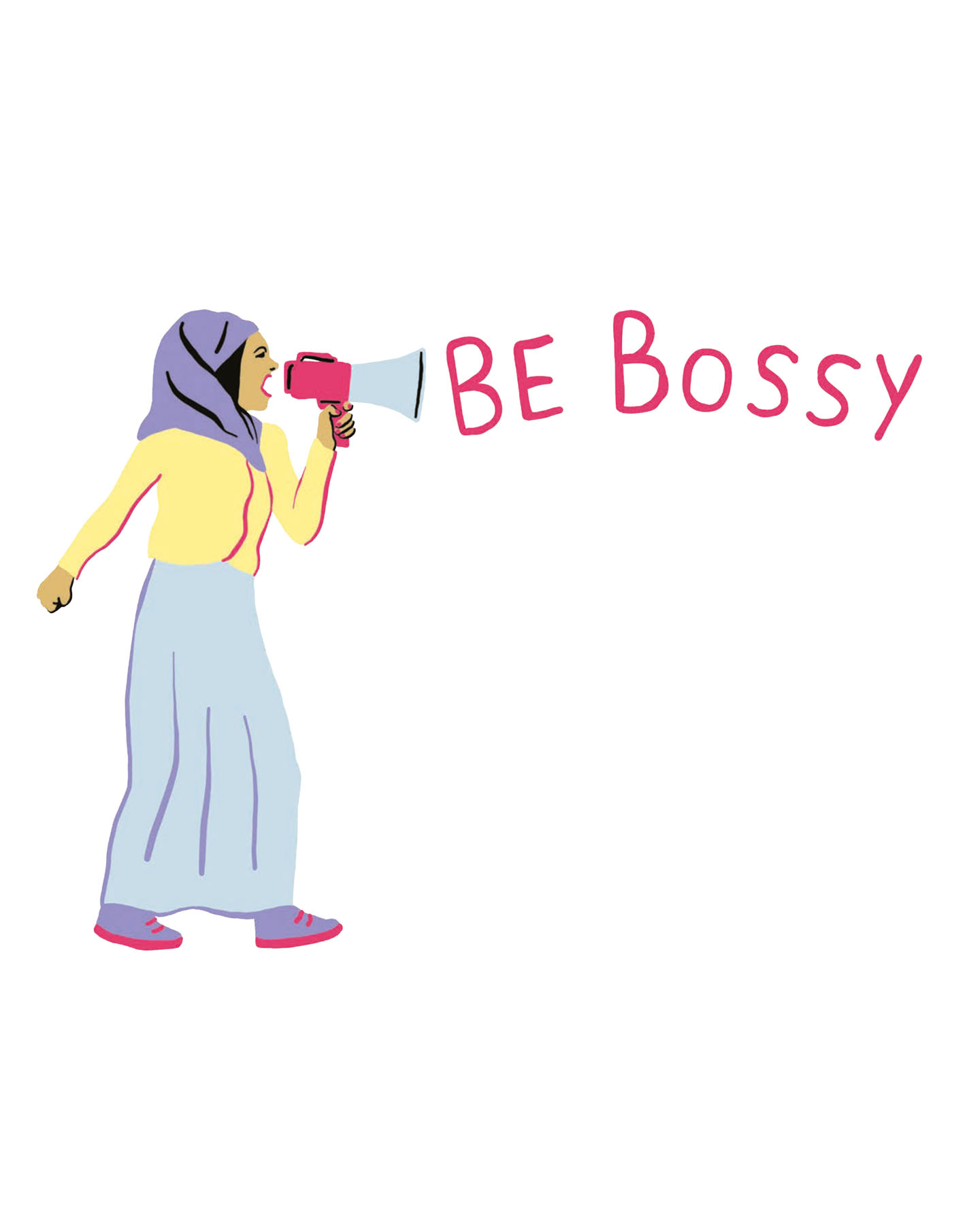
CHAPTER TWO
Be Bossy
The B-Word
In second grade, I was working on a class project about the Amazon rain forest. I was excited because my group got to make a giant poster covered in trees, parrots, and jaguars. I was in the flow, sharing my ideas with the other kids on how we could make our poster even better.
All of a sudden, one of the boys said, “Sadie, stop being so bossy.”
I closed my mouth. This was the first time someone had called me that. I was embarrassed and confused. Was I being too assertive by being a leader of the project? Or by giving suggestions? I was proud of my knack for organizing groups and coming up with ideas. I didn’t think there was anything wrong with that. In fact, I thought people appreciated it. But now I was being insulted for that very habit. I stayed quiet for the rest of class.
Over the years, classmates continued to call me bossy: a boy in fifth-grade history class, a girl in eighth-grade gym class, a boy in tenth-grade math class. Eventually I realized that they kept calling me bossy because I am bossy. It’s been in my nature since I was a baby. But it’s not something to be ashamed of—it can be a strength. It’s what makes me strong-willed, productive, and, okay … maybe … sometimes … a little feared.
Hear Her
I wanted to hear other young women’s experiences with being called bossy, so I texted a bunch of them and asked. Here’s what they said:
Tomato/Tomahto
Have you ever heard a man or boy called “bossy”? Probably not. When males are forceful, they’re praised for their take-charge attitude. This is because they’re raised to be leaders. Meanwhile, females are taught that men should be in charge and that we should take the passenger seat. Words such as bossy are used for females when someone feels threatened by our confidence, intellect, or leadership and wants to put us in our place.
The Economist observed this double standard by looking at phrases commonly used to describe men and women. They found that certain words are used almost exclusively to put down women, while nearly the exact same traits are used to praise men. Here are some examples:
So what can we do about this double standard?
Let’s start by treating words such as bossy as a compliment. Bossy can be powerful. Instead of shying away from it, let’s be bossier than ever. From working on group projects in second grade to speaking on the House floor in Washington, DC, let’s be as expressive and bold as boys are taught to be—more, even.
Of course, part of being bossy is being respectful and kind. While we’re being assertive, we can honor other people’s voices at the same time.
Here are some ways you can flex your bossiness:
 Raise your hand in class more often.
Raise your hand in class more often.
 Speak up when you disagree with somebody’s opinion.
Speak up when you disagree with somebody’s opinion.
 Place yourself in charge of a project or group.
Place yourself in charge of a project or group.
 When someone talks over you, finish your thought instead of automatically yielding.
When someone talks over you, finish your thought instead of automatically yielding.
This last one might feel super awkward. But it can also be a winning strategy. Kieran Snyder, a tech entrepreneur, found that during meetings, men interrupted the person speaking twice as often as women did. But she noticed something surprising: there were three women who interrupted as often as men did; each woman was a top-tier executive at the company. So, in order to advance our careers, it may help to learn how to interrupt and talk over people—an art men have so wonderfully mastered!
Be the Boss
Across the globe, women and girls are expressing their strong personalities more than ever. They’re becoming entrepreneurs and CEOs, and surprising the world with their bossiness. Mikaila Ulmer is one of them. At age four, Mikaila started a company called Me & the Bees Lemonade. Now she’s in high school and her company is booming. Between school and sports Mikaila still finds time to present at trade shows, speak to thousands of people, and take meetings with investors—flexing her bossy muscle all the while. Oh, and she once introduced President Barack Obama at a national summit!
Mikaila told me that adults have underestimated her since she was a little girl. “I’m an African American, I’m fourteen years old, I’m a female,” she said. Many people automatically assume she’s too young to have a successful business. One investor asked Mikaila if she squeezes the lemons herself. She calmly replied, “No, I have an actual lemonade company; it’s in eighteen hundred stores.”
But along with being underestimated can come immense satisfaction. Throughout her meetings and speeches, Mikaila is helping to fight against the double standard. She says it’s “pretty gratifying when you’re able to break stereotypes of who can be a successful entrepreneur and inspire others to do the same.”
Q&A
Q: I’m trying to get more comfortable sharing my opinions in class. But some kids still roll their eyes and mumble that I’m being bossy or pushy. What can I say to them?
A: Use it as a teaching moment! Respond in a way that helps other people recognize the double standard. You could try one of these:
 “Thank you!” (my personal favorite)
“Thank you!” (my personal favorite)
 “I must have misunderstood—I thought we could voice our opinions.”
“I must have misunderstood—I thought we could voice our opinions.”
 “If you have another idea, I’m all ears.”
“If you have another idea, I’m all ears.”